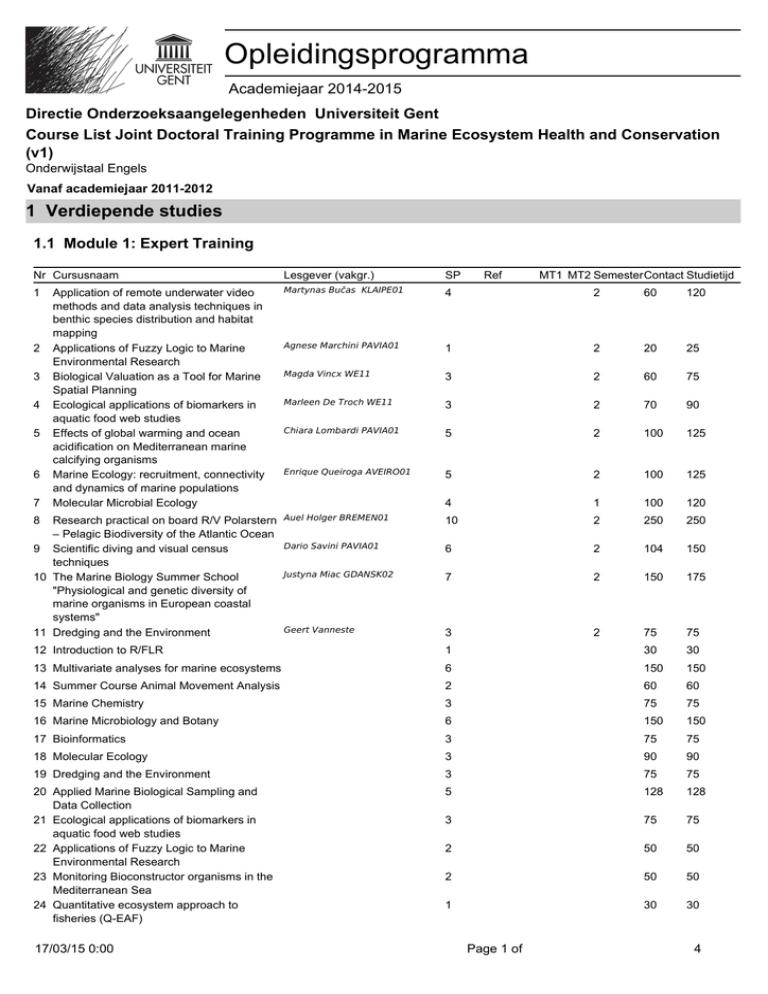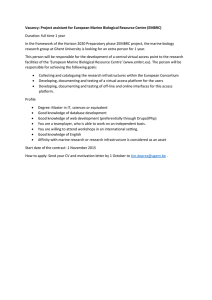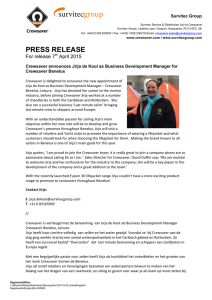Opleidingsprogramma - Studiegids
advertisement

Opleidingsprogramma Academiejaar 2014-2015 Directie Onderzoeksaangelegenheden Universiteit Gent Course List Joint Doctoral Training Programme in Marine Ecosystem Health and Conservation (v1) Onderwijstaal Engels Vanaf academiejaar 2011-2012 1 Verdiepende studies 1.1 Module 1: Expert Training Nr Cursusnaam Lesgever (vakgr.) SP 1 Martynas Bučas KLAIPE01 4 2 60 120 Agnese Marchini PAVIA01 1 2 20 25 Magda Vincx WE11 3 2 60 75 Marleen De Troch WE11 3 2 70 90 Chiara Lombardi PAVIA01 5 2 100 125 Enrique Queiroga AVEIRO01 5 2 100 125 2 3 4 5 6 7 Application of remote underwater video methods and data analysis techniques in benthic species distribution and habitat mapping Applications of Fuzzy Logic to Marine Environmental Research Biological Valuation as a Tool for Marine Spatial Planning Ecological applications of biomarkers in aquatic food web studies Effects of global warming and ocean acidification on Mediterranean marine calcifying organisms Marine Ecology: recruitment, connectivity and dynamics of marine populations Molecular Microbial Ecology 8 Research practical on board R/V Polarstern – Pelagic Biodiversity of the Atlantic Ocean 9 Scientific diving and visual census techniques 10 The Marine Biology Summer School "Physiological and genetic diversity of marine organisms in European coastal systems" 11 Dredging and the Environment Ref MT1 MT2 Semester Contact Studietijd 4 1 100 120 Auel Holger BREMEN01 10 2 250 250 Dario Savini PAVIA01 6 2 104 150 Justyna Miac GDANSK02 7 2 150 175 Geert Vanneste 3 2 75 75 12 Introduction to R/FLR 1 30 30 13 Multivariate analyses for marine ecosystems 6 150 150 14 Summer Course Animal Movement Analysis 2 60 60 15 Marine Chemistry 3 75 75 16 Marine Microbiology and Botany 6 150 150 17 Bioinformatics 3 75 75 18 Molecular Ecology 3 90 90 19 Dredging and the Environment 3 75 75 20 Applied Marine Biological Sampling and Data Collection 21 Ecological applications of biomarkers in aquatic food web studies 22 Applications of Fuzzy Logic to Marine Environmental Research 23 Monitoring Bioconstructor organisms in the Mediterranean Sea 24 Quantitative ecosystem approach to fisheries (Q-EAF) 5 128 128 3 75 75 2 50 50 2 50 50 1 30 30 17/03/15 0:00 Page 1 of 4 25 Marine Ecology: recruitment, connectivity and dynamics of marine populations 26 GIS in Marine Environment 5 125 125 5 125 125 27 The Marine Biology Summer School: Physiological and genetic diversity of marine organisms in European coastal systems 28 Marine evolution under climate change (CEMEB) 29 Extreme environments and deep-sea ecosystems 30 Discovering Amphipod Families 7 175 175 3 75 75 6 150 150 2 50 50 31 Marine Biodiversity: Expertise in Flora 6 150 150 32 EMBOS Training School: "Marine Biodiversity Observation: A system to bring theory and practice together 33 GENUS: Ocean Data View workshop 3 90 90 1 30 30 34 Aquatic Invasion Ecology 5 125 125 35 Marine Ecological and Environmental Genomics 36 Spatial Movement Models and Remotely Sensed Environmental Data for Real-World Conservation 37 Isotope Ratio Mass Spectrometer Training Course 38 Professional Diving Training 3 80 80 5 125 125 3 90 90 3 75 75 39 Workshop on Molecular Evolution 3 75 75 40 Dredging and the Environment 3 75 75 41 Applied Marine Biological Sampling and Data Collection 42 Applications of Fuzzy Logic to Marine Environmental Research 43 Stable isotopes: analysis and application in trophic ecology 44 Scientific Diving Training Course - A Long Term Monitoring Programme on Reef Communicty at Bangka Island (Indonesia) 45 Adaptation and Physiological Responses of Metazoans to Changing Environments 46 An introduction to generalised linear models using R 47 Quantitative ecosystem approach to fisheries (Q-EAF) 48 Effects of ocean acidification and global warming on Mediterranean marine organisms 49 Advanced Course on Fluorescence Microscopy and Image Analysis 50 The use of Trait Based approaches in Community Ecology and Stress Ecology 5 125 125 2 50 50 3 75 75 2 60 60 2 50 50 4 100 100 1 30 30 5 125 125 1 25 25 2 50 50 1.2 Module 2: Transferable Skills Nr Cursusnaam Lesgever (vakgr.) SP 1 Anastasija Zaiko KLAIPE01 4 2 80 100 3 2 80 90 5 2 80 125 4 2 100 100 4 2 80 100 2 3 4 5 Bioinvasion impact assessment: indicators and applications Artûras Razinkovas KLAIPE01 Coastal & Lagoon Ecosytem Modelling (ECOPATH/ECOSIM): From Hydrodynamics to Fisheries Victor Quintino AVEIRO01 Experimental Design and Analysis of Multivariate Biological Data Jesus Dubert AVEIRO01 Physical Oceanography and Modelling Relational Databases as tools for marine 17/03/15 0:00 Tim Deprez WE11 Ref Page 2 of MT1 MT2 Semester Contact Studietijd 4 data management 6 Science and Dogma: Testing Hypotheses Igor Khmelinskii FARO01 2 1 40 50 Dina Simes FARO01 Three days course on strategies for recombinant protein production 8 Three days Proteomics course: from 2DE to Dina Simes FARO01 protein identification by mass spectrometry 9 Hands-on training in protein separation by Alexandre Campos two-dimensional gel electrophoresis and protein characterization by MALDI-TOF/TOF mass spectrometry. Proteomic tools for analysis of protein expression 10 Nursery ground ecology: methods of study Joana Campos and analysis Tim Deprez WE11 11 MARES Annual Meeting Edition 1 2 2 40 50 2 2 40 50 2 2 50 50 5 2 125 125 5 2 150 150 12 Science Communication and Public Debate 1 30 30 13 PhD Candidate Seminar 2012 2 50 50 14 French Foreign Language (B1) 3 75 75 15 MARES Annual Meeting Edition 3 5 150 150 16 Introduction to Statistics in R 1 25 25 17 General Teaching Associates Course 1 25 25 18 Living and Studying in Germany 2 50 50 19 General introduction to Marine Microbiology 8 200 200 20 Excursion and Practical Field course Sylt 2 50 50 21 Experimental Design and Analysis of Multivariate Data 22 Meta-Analysis of Biological and Ecological Data 23 MARES Annual Meeting Edition 2 5 125 125 3 90 90 5 150 150 24 Italian Foreign Language (B1) 5 125 125 25 SOLAS: Basic training for seaman according to the Regulation STCW A VI/1 od International Convention on Standards of Training, Certification and Watchkeeping for Seafarers 26 HUGIN Bayesian Networks and Influence Diagrams 27 Introduction to R 3 75 75 2 50 50 1 25 25 28 Dutch as foreign language - level 1 Nederlands voor Anderstaligen 29 Molecular Microbial Ecology 4 110 110 4 100 100 30 Science and Dogma: Testing Hypotheses 2 50 50 31 Experimental Design and Analysis of Multivariate Data 32 Postgraduate Research Skills and Methods 5 125 125 9 225 225 33 German Language Course A1.1 2 50 50 7 2 Andere studieactiviteiten Nr Cursusnaam Lesgever (vakgr.) SP Ref MT1 MT2 Semester Contact Studietijd 1 Paper 1 0 0 0 2 Paper 2 0 0 0 3 Paper 3 0 0 0 4 Paper 4 0 0 0 5 Paper 5 0 0 0 6 Congres 1 0 0 0 7 Congres 2 0 0 0 17/03/15 0:00 NVT Page 3 of 4 Onderwijstalen Wanneer een cursus niet (enkel) gedoceerd wordt in de onderwijstaal van het programma, worden de werkelijk gebruikte talen aangeven tussen haakjes na de cursusnaam, met de volgende betekenis: bg: Bulgaars de: Duits es: Spaans ja: Japans pl: Pools sh: Kroatisch/Servisch zh: Chinees cs: Tsjechisch el: Grieks fr: Frans nl: Nederlands pt: Portugees sl: Sloveens da: Deens en: Engels it: Italiaans no: Noors ru: Russisch sv: Zweeds Semesterinformatie Semesters worden aangegeven door hun nummer (1 of 2); semester 3 stelt de zomerperiode voor. Wanneer een semesternummer wordt voorafgegaan wordt door een letter, geeft dit aan dat de cursus aangeboden wordt in meerdere sessies. De letter stelt dan de betrokken sessie voor. Wanneer een semesternummer tussen haakjes wordt getoond betekent dit dat de cursus dit academiejaar niet aangeboden wordt in de betrokken aanbodsessie. De aanbodfrequentie en het eerstvolgende aanbod worden aangegeven door de onderstaande codes: a: tweejaarlijks c: jaarlijks, vanaf 2015-2016 f: jaarlijks, vanaf 2016-2017 i: jaarlijks, vanaf 2017-2018 b: driejaarlijks d: tweejaarlijks, vanaf 2015-2016 g: tweejaarlijks, vanaf 2016-2017 j: tweejaarlijks, vanaf 2017-2018 e: driejaarlijks, vanaf 2015-2016 h: driejaarlijks, vanaf 2016-2017 k: driejaarlijks, vanaf 2017-2018

